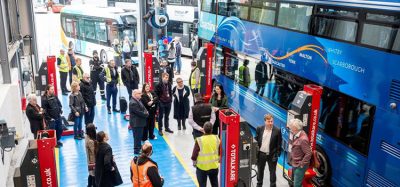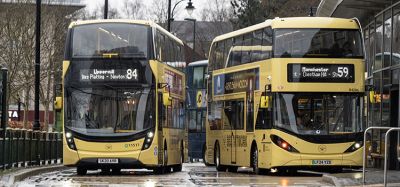Three questions to Gabe Klein, keynote speaker at IT-TRANS 2016
- Like
- Digg
- Del
- Tumblr
- VKontakte
- Buffer
- Love This
- Odnoklassniki
- Meneame
- Blogger
- Amazon
- Yahoo Mail
- Gmail
- AOL
- Newsvine
- HackerNews
- Evernote
- MySpace
- Mail.ru
- Viadeo
- Line
- Comments
- Yummly
- SMS
- Viber
- Telegram
- Subscribe
- Skype
- Facebook Messenger
- Kakao
- LiveJournal
- Yammer
- Edgar
- Fintel
- Mix
- Instapaper
- Copy Link
Posted: 1 February 2016 | IT-TRANS | No comments yet
A public transport enthusiast, Gabe Klein is American and lives in Washington D.C., USA. ..


Gabe Klein, 44, will be the keynote speaker at IT-TRANS (1-3 March 2016), the leading international Conference and Exhibition on IT solutions for public transport.
A public transport enthusiast, Gabe Klein is American and lives in Washington D.C., USA. His whole career has been centred on mobility and technology issues, which made him one of the main voices for urban mobility in the USA. After beginning his career in the bike industry in the 1990s, he developed car-sharing in Washington D.C. as the regional Vice President of the quickly growing company Zipcar. Moving to the public sector, he then became responsible for transport in two major American cities: Washington (2008-2010) and Chicago (2011-2013). In Washington, Gabe Klein was appointed Director of the District Department of Transportation (DDOT), which he transformed to make it more customer-oriented and innovative. The DDOT has become a trendsetter in terms of multi-modal innovation, customer interface, parking technology and bike-sharing. In Chicago, Gabe Klein worked for the Mayor Rahm Emmanuel as the Commissioner of the Department of Transportation. He launched a large-scale bike-share system and made the city a unique example for innovation in transportation and public space. Besides these activities, Gabe Klein has also been advisor for different cities, associations and start-ups (Los Angeles, RideScout, NACTO, Streetsblog, Bridj…) and has recently released a book: Start-up city. Since last year, he is also Special Venture Partner at Fontinalis Partners, a venture capital firm that only invests in technology companies able to significantly improve mobility.
Thanks to these key positions both in the private and the public sector, Gabe Klein supports the use of data and technology for the implementation of integrated mobility systems and customer-focused operations at the city and regional levels.
Drawing on this broad knowledge of urban mobility and new technology issues, Gabe Klein will deliver an inspiring keynote speech at IT-TRANS. Ahead of the event, we asked him three questions:
1) Today it’s all about the sharing economy, open data, e-mobility, automation… What will be the next big step regarding urban mobility?
Will autonomous and connected vehicles help or hurt transit? Should we embrace or shy away from it? Or allow car companies to push for individual ownership? We can enhance transit and urban density and embrace tech; we’re smarter this time and tech is pushing us to a more shared model. This new model includes the integration of new transit options, which can’t be achieved without elaborating a legal framework to address the many regulatory questions that have emerged with the development of IT solutions.
Besides this regulatory aspect, the other big step lies in the business opportunities that go along with the emergence of new mobility services. Cities are realising that the expansion of services with new tech represent a big business opportunity and that they need to engage on this.
Finally, we have to find solutions to keep cities affordable (affordable housing, affordable places around public transport…) – and transit is a key part of making cities affordable.
2) What is missing today to make the use of data more effective?
Data will become less valuable but will remain essential for planning. Governments need to open up data. They belong to the people that created it and opening up is democratic. Public transport companies and agencies should use data to leverage the private sector.
3) You have worked in private and customer-facing businesses: What can the private sector bring to the public sector, especially to public transport?
Transport agencies can learn from best practices from the private sector because innovation comes from there (payment systems, apps that can integrate multimodal trip planning…). Moreover, learning from the private sector means low risk and high return: there is a real opportunity to use private prowess to improve their systems with little risk because private companies have already tested new services in the “real world”.
Will new technologies advance or impede transit? What is the role of the government? The development of new technologies and the collaboration between the private and public sector give the possibility of a win-win situation. With regards to this collaboration, the situation is different in the USA. Here there are more opportunities to learn from public-private partnerships.








